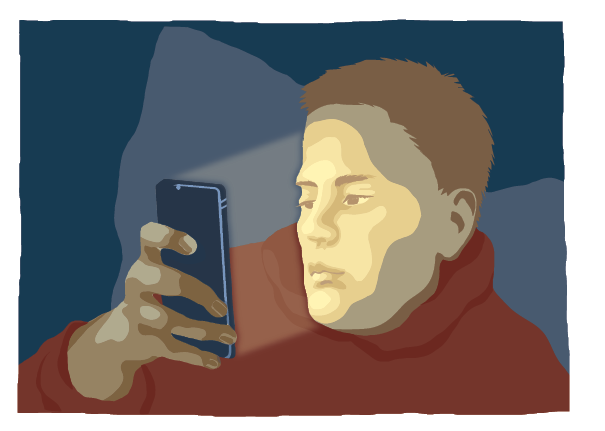
Hit Pause
The time has come to think more wisely, hasn’t it?
The Dalai Lama
Ping! Your phone reminds you that an appointment is coming up.
Buzzzz. Time to change classes.
10-9-8-7-6-5-4-3-2-1 Countdown to midnight on New Year’s Eve!
It’s crazy how much time we spend paying attention to time. “What time is it?” has got to be one of the most common questions in the world.
We all have exactly the same amount of time every day. What do we do with the 24 hours we each get between sunrises? And why does that matter?
Okay, the obvious. We spend most of our time sleeping, eating, and going to school or work. Everybody has to brush their teeth, shower, get dressed. Often do homework, practice sports, play music – you get the picture. It’s the other time we’re talking about here, the hours you still have left over. Maybe you don’t have very many extra hours; maybe you’d like a lot more free time. But you do have some unscheduled time.
More and more, the answer is that you spend it on a screen. In fact, the average teenager reportedly spends nine hours a day on a laptop, smartphone, or tablet, or in front of a TV.

How does anyone pull nine hours out of an average day to spend with media technology? Often, you multi-task. You watch a video while brushing your teeth, turn up the music when you’re in the shower, video chat with a friend while you’re doing the dishes, watch television while doing your homework, text when you’re eating dinner, and post photos online doing just about everything. Occasionally you kick back and do one thing at a time, like play a video game. But mostly you have at least two things going at once.
And many of you don’t think this makes any difference in the quality of your life, your work, or your ability to learn. You think following one football game on your phone when you’re watching another on TV is just fine. You defend the idea that listening to music at the same time you’re writing an essay is actually helpful. (Okay – one way you’re right here. Listening to music that doesn’t have lyrics works. Jazz, classical, instrumental. But writing words and listening to words at the same time – nope. Not how the brain works best.)
Evidence clearly contradicts the belief that there’s no problem with multi-tasking, that it’s a good way to get lots of things done. “Evidence clearly contradicts” is a polite way to say that idea is wrong. The brain is negatively affected. So is everyone else’s brain when they multi-task – your parents, your teachers, your doctor. Our brains work best when we give our attention to one. thing. at. a. time.
Spending a lot of time multi-tasking on tech devices is related to a reduced ability to focus on what really matters. In other words, people who spend a lot of time with their attention bouncing from one device to another can’t concentrate as well as others, even when the devices are turned off.
You need concentration to follow a recipe, take exams, score a goal, write a song, and do just about anything successfully. Not concentrating reduces our pleasure in everything as well as diminishes our ability to understand, create, and perform.
Here’s another thing about spending hours every day on digital media: Those hours are too often a substitute for deeper communication. The kind where you look in a person’s eyes, speak to them personally. Doing so helps us develop empathy.
Empathy, kindness, and compassion arise more easily face-to-face than online.
Think about it: Have you ever written anything in a text or on social media that you’d never say to someone’s face? Or seen where people make mean comments online just because they can get away with doing that? Be nice is advice we forget too easily when we’re pounding a keyboard.
No one’s saying to ditch your phones or trash your TV. Turn ’em off sometimes, yes, especially for the first and last hour of the day. You’ll start more focused and end more peacefully. Try it for an hour, then maybe two. The Earth kept twirling around, didn’t it? We live in a digital world, but we have to live in it wisely. We have to be smarter than our phones.
Who’s in control here? If the answer is “our devices,” we need to change course. Give our brains a chance to really focus and our hearts a chance to connect.